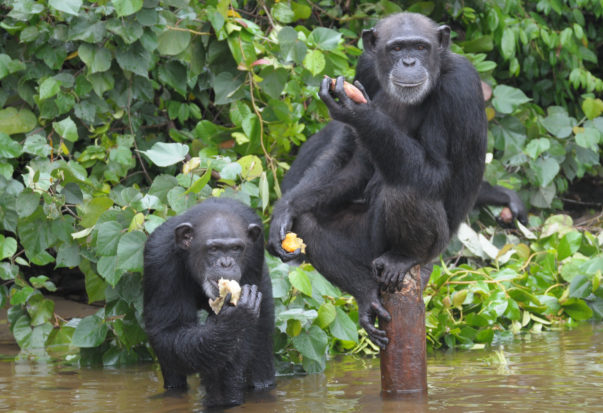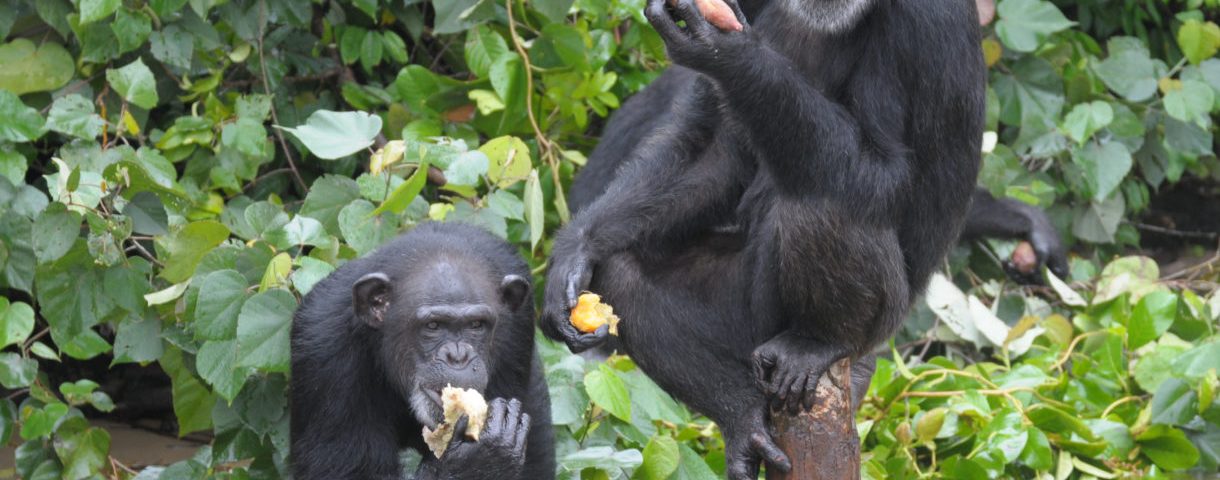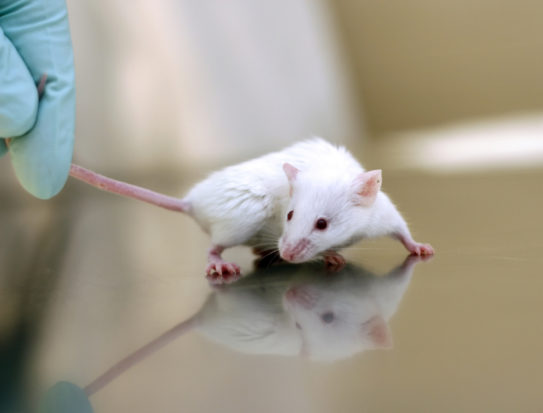At The HSUS and Humane Society International, as part of our commitment to all animals, we put our shoulder into the moral and scientific problems of using animals in research and testing. In doing this work, we follow the framework of the Three Rs – refining, reducing, and replacing the use of animals. That approach resonates with so many researchers, since no one should want to use animals if there are alternatives. There’s a consensus that hurting animals in research and testing is a moral problem, and we can get past it entirely if there are alternative methods and other strategies that work, and are actually superior, in their place

The chimpanzees abandoned on a series of islands in Liberia by the New York Blood Center continue to thrive under our care. Photo by Jenny Desmond/For The HSUS
Today, I run down some of our most important gains in this realm, and note that so much work lies ahead.
NIH announces plan to retire chimps:
In August, the National Institutes of Health released an official plan for the retirement to permanent sanctuary of hundreds of government-owned and -supported chimpanzees. The development followed prior NIH announcements that it was getting out of the business of using chimps in invasive experiments. The decision to end decades of invasive government-funded experiments on chimps came after expert deliberations concluded with a declaration that chimpanzees are no longer necessary for biomedical research, given the development and recognition of alternative methods and approaches. It also followed a momentous 2015 decision by the U.S. Fish and Wildlife Service, in response to an HSUS-led petition, to close the gate on invasive chimp experiments by listing captive chimpanzees as endangered under the Endangered Species Act, providing them the same level of protections as wild chimpanzees.
Work to support chimpanzees abandoned by New York Blood Center in Liberia gains momentum:
Since 2015, The HSUS and HSI, with the support of the government of Liberia and others, have been taking care of a group of more than 60 chimpanzees abandoned on a series of islands in Liberia, without food and water, by the New York Blood Center. In 2016, as the chimps continued to thrive under our care, we announced a collaborative campaign with former New Mexico governor and U.N. ambassador Bill Richardson to secure a safe future for the chimpanzees. The Richardson Center for Global Engagement is committed to holding the Blood Center accountable for its responsibility to chimpanzees but also to provide support for proper sanctuary of the beleaguered chimps until that responsibility is reclaimed. Insurance giant MetLife said it was ending its support for the New York Blood Center until the company resolves its dispute with The HSUS and other groups over the medical charity’s abandonment of the chimps. Citibank, after learning the facts of the case, took a similar action, disassociating itself from NYBC and then donating $50,000 to The HSUS to be used to care for the chimps. A number of celebrities, including sisters, actresses, and New York natives Kate and Rooney Mara, stepped up to draw the world’s attention to the plight of the chimps and to demand that NYBC work with The HSUS to ensure their care.
The EPA is moving away from its long-standing requirement for pesticide manufacturers to perform dozens of tests on dogs, rabbits, rats, mice, and guinea pigs. Photo by iStockphoto
Project Chimps partners with New Iberia Research Center with plans to retire 200 chimpanzees:
In May, a partnership agreement was announced between Project Chimps—a new sanctuary in northern Georgia backed financially by The HSUS and other parties—and the University of Louisiana at Lafayette’s New Iberia Research Center laboratory to retire 220 chimpanzees. NIRC had been the subject of an HSUS undercover investigation in 2009, and the transfer of these chimps was a remarkable conclusion to a saga that included hundreds of steps to get to this point where invasive experiments have ended and the chimps are on their way to a new life. In September, nine chimpanzees from NIRC safely arrived at Project Chimps, starting the process of moving all of the 220 chimps from laboratories to sanctuaries. The HSUS provided the capital to buy the land for Project Chimps, and we’re proud to be so deeply immersed in this project.
Obama Administration upgrades Toxic Substances Control Act:
In June, President Obama signed into law a bill that upgrades the Toxic Substances Control Act, a 40-year-old federal law regulating the use of chemicals. The bill contains – for the first time in any broader environmental and health protection statute – an explicit decree from Congress to minimize animal testing and to create a clear preference for the development and use of alternative methods and strategies. This will accelerate the movement away from animal tests for safety substantiation of chemicals, as well as pesticides, biocides, cosmetics, and other regulated substances.
EPA will phase out obsolete animal testing practices in favor of alternatives:
The EPA is moving away from its long-standing requirement for pesticide manufacturers to perform dozens of tests on dogs, rabbits, rats, mice, and guinea pigs, including six extremely cruel tests – perversely nicknamed the “six-pack” – carried out on more than 500 new pesticide products brought to market each year in the United States alone. Following negotiations with The HSUS and other stakeholders, the EPA, in November, announced a plan to allow pesticide manufacturers to waive acute dermal toxicity tests for pesticide formulations. The Organization for Economic Cooperation and Development, a group of 34 member nations, approved four new non-animal test methods to assess the safety of chemicals, and a guidance document that describes how to reduce animal use for acute or lethal toxicity tests.
Four years since the launch of our #BeCrueltyFree campaign, 1.7 billion people, or one quarter of the world’s population, live in countries where the sale of animal-tested cosmetics is banned. Photo by iStockphoto
Ending cosmetics testing worldwide:
We have seen a cascade of successes in ending cosmetics testing worldwide, since HSI and The HSUS launched our #BeCrueltyFree campaign in 2012. Today, 1.7 billion people, or one quarter of the world’s population, live in countries where the sale of animal-tested cosmetics is banned. Thanks to our #BeCrueltyFree campaign, we worked to ban animal testing for cosmetics in Taiwan in 2016, while South Korea has made it a legal requirement for companies to use animal testing alternatives where available, and the Australian government pledged to ban cosmetics animal testing and trade in the coming year. Many other countries, including Canada, Brazil, Argentina, Japan, and Russia, are considering bans on animal-tested cosmetics. Here, in the United States, the Humane Cosmetics Act was introduced in Congress. So far, 195 companies in the cosmetics industry have endorsed the legislation.
USDA imposes record penalty for animal abuse in testing:
In May, the U.S. Department of Agriculture and Santa Cruz Biotechnology – one of the world’s largest suppliers of antibodies for biomedical research — came to a $3.5 million settlement agreement, the largest in the 50-year history of the enforcement of the Animal Welfare Act. Over the years, the USDA found serious violations of the law at this laboratory, including numerous severely sick and injured animals, inadequate veterinary care, failure to avoid and minimize pain and distress, and failure to consider alternatives to procedures involving animal pain and distress. SCBT lost its license to operate as a dealer, as well as its registration to operate as a research facility with the USDA, essentially shutting the business down.
New York passes law to find homes for dogs, cats used in biomedical research:
New York Governor Andrew Cuomo signed a law to require that publicly-funded institutions of higher education give dogs and cats used in biomedical research and testing a second chance at adoption into forever homes—a lifeline for hundreds of dogs and cats in state-funded institutions.
In the year ahead, we’ll be pushing for the United States to ban cosmetic testing by enacting the Humane Cosmetics Act, we’ll continue our efforts to get all chimps out of labs, and we’ll drive ahead our campaigns to replace animal testing with non-animal methods throughout the world.
The post Gains to limit animal research and testing in 2016 appeared first on A Humane Nation.
Enviroshop is maintained by dedicated NetSys Interactive Inc. owners & employees who generously contribute their time to maintenance & editing, web design, custom programming, & website hosting for Enviroshop.


